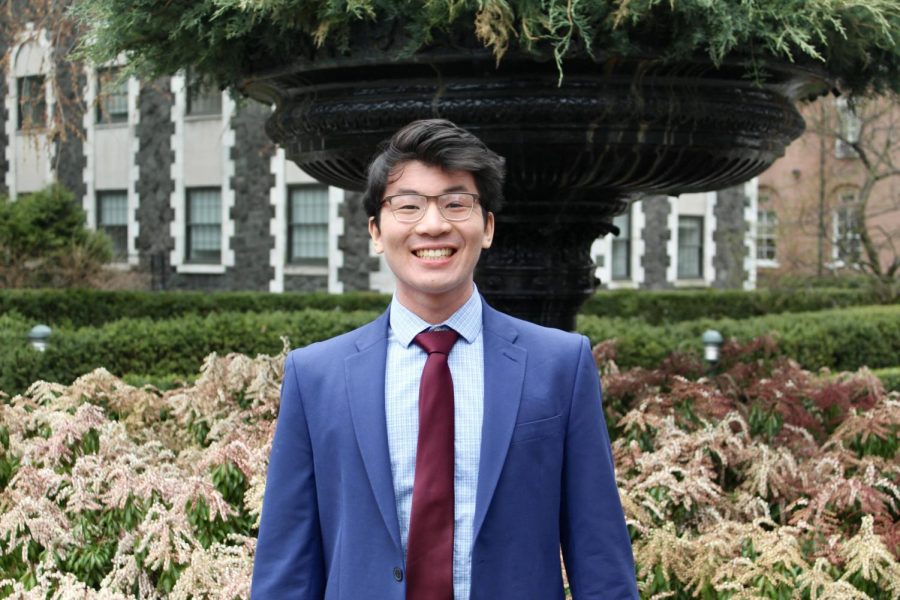Fordham Senior Writes Musical About Shanghainese Immigrant
For the past three years, Miguel Sutedjo, FCRH ’23, has been working on writing his own musical for his senior thesis project. Over the summer, Sutedjo, who is studying music, international political economy and Mandarin, received a grant from the university to participate in the Narnia International Vocal Arts Festival in Narni, Italy. At this festival, Sutedjo had the opportunity to premiere two new theatric vocal works, an art song and a musical theater scene. Sutedjo was also able to have his pieces performed by professional musicians and singers.
“Using the knowledge that I gained while workshopping and premiering those pieces, I have since come back and used the tools that I have learned from there to inform this musical that I’m working on,” said Sutedjo.
Writing this musical has been an ongoing process for Sutedjo, but using the musical as his senior thesis project has provided him with a more rigid framework and structure to complete the work. The musical, entitled “A Taste” is Sutedjo’s reflection on the Asian American hustle culture that is present in America.
The plot centers around a Shanghainese businessman father and his jazz pianist son who move from Shanghai to New York City’s Chinatown. The son decides to explore the city’s jazz culture against the wishes of his father, who wants him to follow the standard, more traditional path of studying and going to college. Within the musical, Sutedjo explores the themes of the conflict between passions and practicality and how American society defines success.
Sutedjo wrote the first song for his musical many years ago. The song is used in a scene during which the main character reflects on his life as he prepares to move from Shanghai to New York City with his father. After this initial song, Sutedjo started to construct an outline for the plot of the musical and the story he wanted to convey.
After nailing down this outline, Sutedjo wrote the songs and the script for the musical. Then Sutedjo focused on revising, editing and receiving feedback from his advisor here at Fordham, Eric Bianchi, Ph.D., of the music department.
“That process varies from day to day, some days I’ll be writing a new number, some days I’ll be going out and studying a musical’s libretto or score and seeing what I can learn from that and doing that analysis to inform my own work,” said Sutedjo.
Some of Sutedjo’s classes this semester, like Asian diasporic literatures and a class on famed composer Stephen Sondheim, have also been extremely helpful and relevant to his project as well.
Throughout his entire life, Sutedjo has always been extremely involved in music and in many different types of musical disciplines.
He started classical piano at the age of three and later switched to jazz piano during high school. He also participated in musical theater during high school.
“For me, I knew I wanted to try it out because I felt like writing musicals combines all of my skill sets into one project, but as I kept on working on it, it’s really been sort of the culmination of not only my artistic journey over these past 21 years but also intellectually how I view myself as an Asian American facing a lot of the same issues regarding hustle culture,” said Sutedjo.
This element of the musical is essential for Sutedjo. He said that he strives to be “emotionally autobiographical” in the work that he creates.
Looking towards the future, Sutedjo hopes that in the spring, he can put on some sort of reading or performance of his musical.
Since the musical meditates on the Asian American experience, Sutedjo wants to use a cast made up of entirely AAPI performers.
He is unsure whether or not he will have to look outside of Fordham for these resources. After that, Sutedjo says that he would love to be able to do some sort of professional production of the show, but he mostly will just be reaching out to people and seeing where the project can go.
“But at the end of the day, I think for me, writing this piece is not only just a musical that I’m doing but an emotionally charged, memory type work as well, and I think that the process of it has already been so fulfilling that I think that for me, it’s enough reward even if it doesn’t go anywhere,” said Sutedjo.















































































































































































































